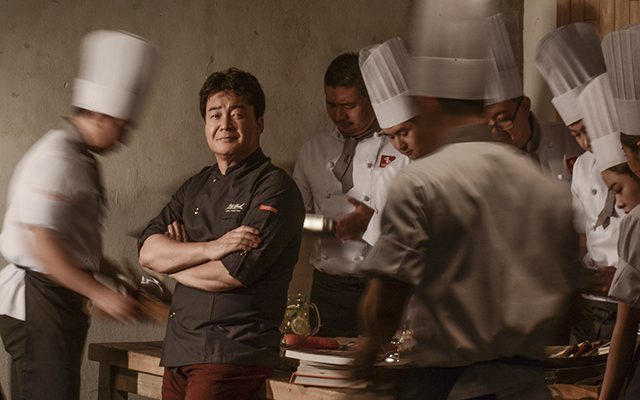- Revolutionizing Korean Food and Culture March 20, 2019
-
Interview with Yonsei alumnus and celebrity food entrepreneur Baek Jong-won
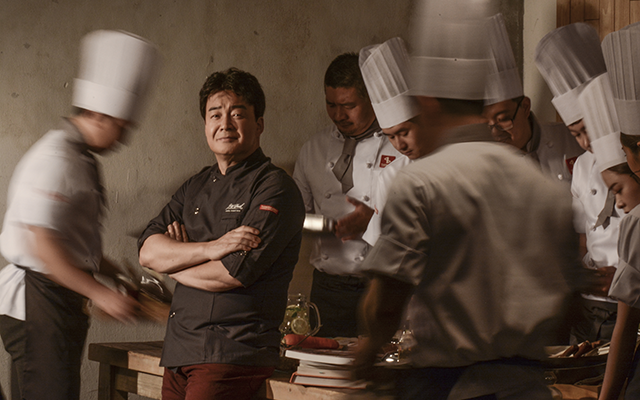
Interview with Baek Jong-won and his never-ending dream to globalize Korean food
A Yonsei alumnus is in the spotlight for introducing a new wave in Korea’s eating out culture by crisscrossing small alleys across the country. Baek Jong-won (entering class of ’85, Social Work), founder and CEO of The Born Korea, is known as a celebrity entrepreneur who has successfully launched various franchises such as Hanshin Pub and Korean barbeque eatery Saemaeul Restaurant. Even near the Sinchon area of Yonsei University in Seoul, Korea, you can find all kinds of restaurants, cafes and pubs labeled with his name.
These days, with TV shows like ‘My Little Television,’ ‘House Cook Master Baek,’ ‘Korean Food War’ and ‘Baek Jong-won’s Alley Restaurant,’ he also has a huge influence on Korean homemade food culture. We met with Yonsei alumnus Baek and listened to his success story about pioneering the eating out business with his novel ideas and impressive volubility.
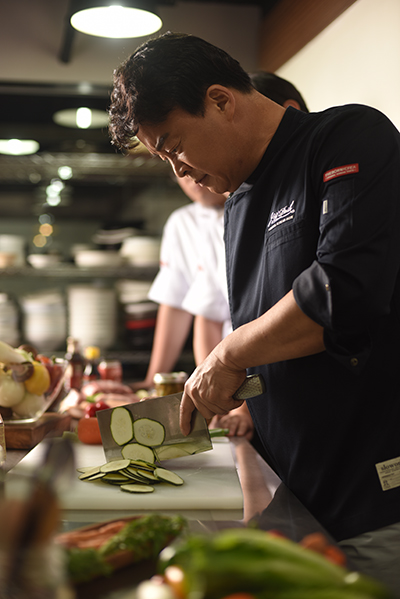
‘Cooking is my strength.’ How Baek became a business owner during his freshman year
Baek, who graduated from the Department of Social Work (currently the Department of Social Welfare), had a very interesting university life. Instead of studying, he traveled across the country in search of tasty restaurants, which helped him accumulate an extensive and comprehensive knowledge of food. He would often cook for his classmates and soon became a central figure in his department.
“When I went to university excursions, I headed straight for the kitchen to cook. Back then, college students mainly just drank a lot with cheap shrimp crackers and kimchi, but I liked to prepare and enjoy delicious side dishes (laughs). I also owned a pub, so I used my earnings to make better dishes for my classmates. Thanks to this, I became quite popular.”
The story of how Baek took over the Korean-style pub where he was working part-time during his first year at Yonsei University is already very well-known. “Although it was rumored that I had bought out the pub with family money, I had never received financial support for my business endeavors,” he said. “Since I liked fried chicken, I started preparing it myself in the pub and improved the recipe.” At a time when delivery service was not that common, Baek also saw the business potential in delivering chicken to nearby apartment buildings which he suggested to the pub owner.
“The pub was a huge success. Around that time, the elderly lady who was running the place became ill, so she sold the business to me. She encouraged me to give it a try and not to worry about paying her back soon. So, I started repaying the debt little by little and became a business owner when I was a freshman student.”
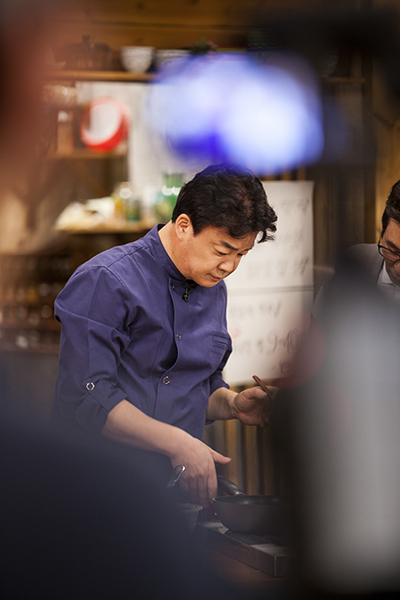
Learning the valuable lesson of failure
Although Baek enjoyed cooking, he had not intended get so involved in the restaurant business – he had originally aimed to become the successful owner of a large company. After his experience overseeing the pub, Baek tried his hand at other businesses such as interior design and importing construction materials. However, the price of imported materials surged due to the IMF crisis, a situation that Baek described as a “complete disaster.”
“I greatly enjoyed running a business. It was not about making money – I enjoyed trying out new ideas and seeing how customers responded,” Baek recalled. “One negative thing I experienced in the restaurant business was that many customers were rude and offensive to restaurant staff, which angered me a lot and was the main reason I wanted to expand out and go out into the ‘bigger world.’ After the IMF crisis, my businesses failed and my dreams were shattered, but ironically, I felt relieved. It was a good opportunity for me to let go of my ego and vanity. At the time, the ssambap restaurant I was running was still doing well, so I focused again on my strength - the food business. I created several brands and naturally went to franchising. I had no professional education on franchising, so I taught myself. The experience of failure helped me abandon foolish dreams, and it molded me into the person I am today.”
“Don't rush to start a business.” First, find something you enjoy doing.
Although Baek tried his hand at various businesses and soon became a well-known entrepreneur, his advice to younger students is, “Do not start a business.”
“Do not rush to start a business. You should first find a job you like doing,” he remarked. “When you set your goals and dreams, you must be doing something you like. People often call me a workaholic, but I am doing this because it makes me happy. Do not think of starting a business as something you are required to do at all costs. If you fall in love with something you enjoy doing, new paths will open to you, may it be starting your own business or getting a 9-to-5 job.”
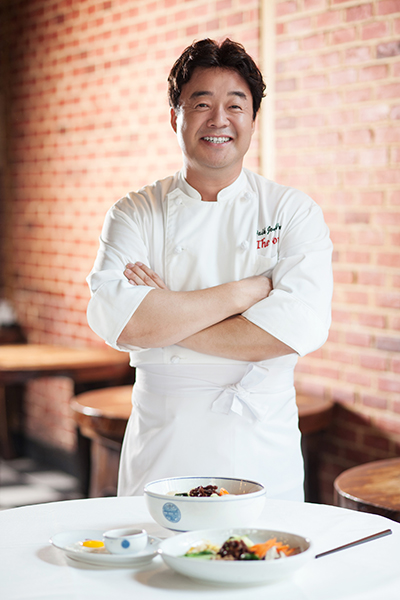
Ask yourself, “What does success mean to me?”
“I will probably receive a lot of backlash for saying this, but I do not think getting a job is all that important. In fact, it shows how narrow-minded we can be. What is the meaning of a successful life? Our measure of success nowadays is how much money or how many welfare benefits we get after graduating from university and entering the workforce. However, there are many people in public offices or big corporations who have regret. People should share the happiness of doing what they like. Start right now and do things you enjoy. Do not think of starting a business as a goal, instead do something you enjoy and it may eventually lead to starting your own business.”
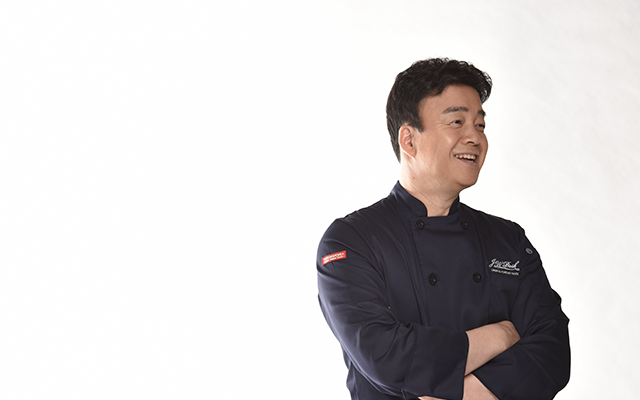
Globalizing Korean food: Baek’s never-ending dream
With The Born Korea, Baek has already become a successful restaurant owner and businessman, but new challenges await this year. First, he is planning to expand his franchising business to globalize Korean food.
“Franchising is not easy in small countries like Korea,” he said. “Korean food could be a strong asset when operating a restaurant business abroad. This is why I want to open a restaurant business abroad with Korean food. I think it would be good if more influential people from the restaurant business contributed in franchising. The costs of having a good brand or idea are so high that our eyes become bigger than our stomachs, so I want to be able to help those people with our franchising platform. After confirming there is business potential on a national level, we can expand abroad. In this way, even small franchises could survive and it will be easier for Korean food to be globalized.”
Baek also announced plans to start a YouTube channel to globalize Korean food further. Nowadays, as many people obtain extensive information from YouTube, Baek said he would like to create localized content where foreigners introduce Korean food in their country's native language.
“I think it would be nice if there were a YouTube channel where foreigners talk about Korean food and introduce restaurants in Korea to viewers,” he commented. We intend to select restaurants across the country and provide support for such YouTubers. Ultimately, our country’s tourism industry will benefit from this. Korea should become a country with a competitive tourism industry. I hope to create a supportive environment for active YouTubers that will give a boost to Korean tourism through its food.”
show mobile menu
mobile menu

